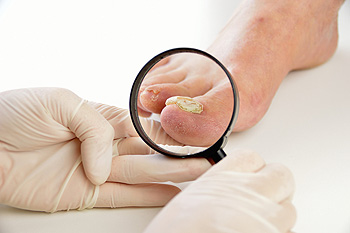
Fungal toenail infections, or onychomycosis, account for approximately 50 percent of all nail diseases, particularly affecting toenails. Laboratory diagnosis through microscopy and culture of nail clippings is recommended before starting treatment to confirm the infection type. For patients requiring treatment of fungal toenails, oral antifungal medications are typically used for severe infections, while topical antifungals are suitable for superficial or minor cases and for those unable to take oral medications. The duration of treatment varies, with systemic medications typically requiring a few months and topical treatments possibly extending up to two years. Patients should be aware that treatment success rates vary, and nails may not return to a completely normal appearance even after successful therapy. Additionally, there is a risk of treatment failure or relapse, necessitating further diagnosis and possibly alternative treatment strategies. Ultimately, the decision to treat fungal nails should be individualized, considering the patient's overall health, risk factors such as diabetes or vascular disease, and the severity of the infection. If you have developed a fungal toenail infection, it is suggested that you schedule an appointment with a podiatrist for a diagnosis and treatment suggestions.
For more information about treatment, contact Rahil Baxamusa, DPM of Illinois. Our doctor can provide the care you need to keep you pain-free and on your feet.
Toenail Fungus Treatment
Toenail fungus is a condition that affects many people and can be especially hard to get rid of. Fortunately, there are several methods to go about treating and avoiding it.
Antifungals & Deterrence
Oral antifungal medicine has been shown to be effective in many cases. It is important to consult with a podiatrist to determine the proper regiment for you, or potentially explore other options.
Applying foot powder on the feet and shoes helps keep the feet free of moisture and sweat.
Sandals or open toed shoes – Wearing these will allow air movement and help keep feet dry. They also expose your feet to light, which fungus cannot tolerate. Socks with moisture wicking material also help as well.
If you have any questions please feel free to contact our office located in Crystal Lake, IL . We offer the newest diagnostic tools and technology to treat your foot and ankle needs.
